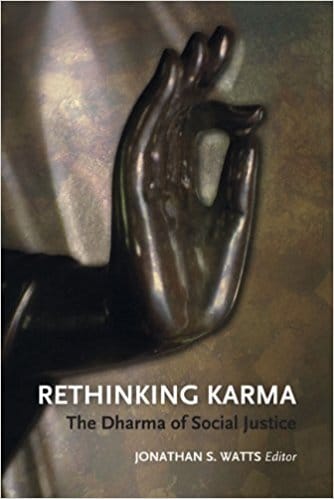Rethinking Karma: The Dharma of Social Justice
Edited by Jonathan S. Watts
Silkworm Books, 2009;
Distributed by University of Washington, 2010
272 pages; $24.95 (paperback)
What is the connection between karma and social justice? It is a fair question. After all, the Buddha had much to say about the practice of being “just” but much less to say, particularly in comparison with the Abrahamic religions, about justice. Rethinking Karma takes a hard look at the relationship between karma and social justice, in which the concept of karma is too often used to justify political and social oppression and exploitation. It also offers a way to think about karma as a collective phenomenon, with implications for social action and change.
The volume is edited by Jonathan Watts—cofounder of the Think Sangha, a loose-knit Buddhist social analysis group linked to the International Network of Engaged Buddhists—and grows out of a 2003 meeting in Chiang Mai, Thailand, looking at the social nature of suffering and of karma. It includes essays by eleven authors who have been involved in social justice issues, and in some cases have suffered greatly for their activism.
In Watts’ introduction, and in a powerful essay by Sri Lankan scholar Nalin Swaris, we find a close investigation of the Buddha’s early teachings on karma and also of the context in which he lived. In his time, the Buddha made a practical, logical, and, for the most part, equitable case against the dominant Brahmanic powers. He relied on clarity and direct experience, never on principles of righteousness or domination.
The Buddha’s teachings on karma and rebirth arise within his brilliant discovery of dependent origination—paticcasamuppada. Karma is, essentially, volitional action, including thoughts, words, and deeds. There are other forms of causation that manifest in the world, but karma is “preceded by mind.” So it is something we can work with and do something about. It is a field of practice.
But according to the Buddha, our understanding of karma and its fruits is often distorted and confounding. We are confused about the suffering we see around us, why bad things happen to good people, and why good things happen to bad people. In an early sutra, the Buddha listed the results of karma as imponderables, saying, “Whoever speculates about these things would go mad and experience vexation.”
We may not untangle the results of karma, but Watts and Swaris, building on a prologue by the late Venerable Buddhadasa Bhikkhu, argue that if the so-called self is co-created or co-conditioned by other beings and by non-self dharmas, then there is no such thing as “my” karma. Watts and Swaris argue that karma is a collective and social manifestation, just as our individual “self” is constructed within society and relationship.
The idea of “collective karma” does not relieve individuals of responsibility for their actions. But if a Buddhist understanding of karma allows for the transformation of individuals, collective karma therefore allows for the transformation of society, which implies a role for social action.
In addition to emphasizing the role of collective karma, Rethinking Karma looks at how the principle of karma has been misused, re-Brahmanized, and applied to validate systems of social and political oppression, and the challenges this presents. Looking at the entanglement of karma and power, Mangesh Dahiwale, a leader of India’s Jambudvipa Trust, which trains young Dalit Buddhists, ex-untouchables, writes of the vital movement begun by Dr. Ambedkar in the twentieth century, and the present-day struggle against entrenched Brahmanic values that twist karma into a rigid principle of caste duty.
Scholar–activists Phra Paisal and Santikaro describe the commodification of dana in Thai Buddhism, which has transformed merit-making into acquisitiveness, as laypeople offer donations in the hopes of attaining a fortunate rebirth. Here dana echoes the function of Brahmanic sacrifices against which the Buddha took an unequivocal stand.
Thai feminist educator and practitioner Ouyporn Khuankaew investigates how distorted understandings of karma have been used to justify family violence. Recalling her own childhood she says, “When my father was violent, my desperate mother, unable to protect her children, would cry out loud and keep saying, ‘What kind of karma have I done? When will this karma end?’” Thai women who approach Buddhist monks for help and spiritual guidance are typically advised to “be patient and accumulate more merit,” and told their problems are the result of bad karma from a previous life. Khuankaew describes the workshop she has developed, structured around the four noble truths, which is designed to help participants deconstruct mistaken notions of karma and see the true root of gender inequality.
Similarly, Burmese activist Khuensai Jaiyen rejects what he calls the “karmic fatalism” of organized Buddhism, as promoted by the Burmese state, in his essay “Liberation as Struggle.” According to karmic fatalism, he writes, “People experience bad fortune, suffering, and death directly as a result of bad karmic deeds of the past.” In his discussion of the Burmese military regime’s treatment of the people of Shan State, Jaiyen explains how this oversimplified view of karma has been used to legitimize structural oppression, as well as “outright direct violence.”
This collection of essays is full of provocative thinking and writing and offers us voices that we don’t often hear in the West—those of Asian grassroots activists firmly grounded in their own practice and culture. We are fortunate to have this opportunity to listen to them and learn.

